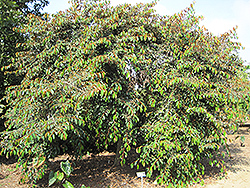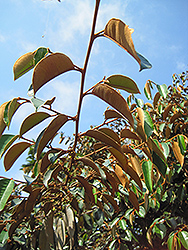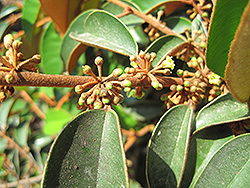It's all about ...
plants

Height: 30 feet
Spread: 20 feet
Sunlight:
![]()
![]()
Hardiness Zone: 10a
Other Names: Damson Plum, Wild Star-apple, Saffron Tree
Description:
A medium-sized tree with aesthetically pleasing, satin textured green leaves with copper undersides; branches will slightly droop as the tree matures; small creamy yellow flowers and purple fruit year round; a great feature for yards and public spaces
Ornamental Features
Satinleaf has attractive dark green foliage with coppery-bronze undersides on a tree with an upright spreading habit of growth. The glossy oval leaves are highly ornamental and remain dark green throughout the winter. It features subtle clusters of buttery yellow star-shaped flowers with white overtones along the branches from late winter to early winter. It produces deep purple berries from late winter to early winter. The mottled khaki (brownish-green) bark adds an interesting dimension to the landscape.
Landscape Attributes
Satinleaf is an evergreen tree with an upright spreading habit of growth. Its relatively coarse texture can be used to stand it apart from other landscape plants with finer foliage.
This is a relatively low maintenance tree, and can be pruned at anytime. It is a good choice for attracting birds, bees and butterflies to your yard. Gardeners should be aware of the following characteristic(s) that may warrant special consideration;
- Invasive
- Self-Seeding
Satinleaf is recommended for the following landscape applications;
- Accent
- Shade
- Hedges/Screening
- Naturalizing And Woodland Gardens
Planting & Growing
Satinleaf will grow to be about 30 feet tall at maturity, with a spread of 20 feet. It has a low canopy with a typical clearance of 4 feet from the ground, and should not be planted underneath power lines. It grows at a medium rate, and under ideal conditions can be expected to live for 50 years or more.
This tree does best in full sun to partial shade. It is quite adaptable, prefering to grow in average to wet conditions, and will even tolerate some standing water. This plant will benefit from an application of bonemeal and/or mycorrhizal fertilizer at the time of planting. It is not particular as to soil type or pH, and is able to handle environmental salt. It is somewhat tolerant of urban pollution. This species is native to parts of North America..
This plant is not reliably hardy in our region, and certain restrictions may apply; contact the store for more information.


